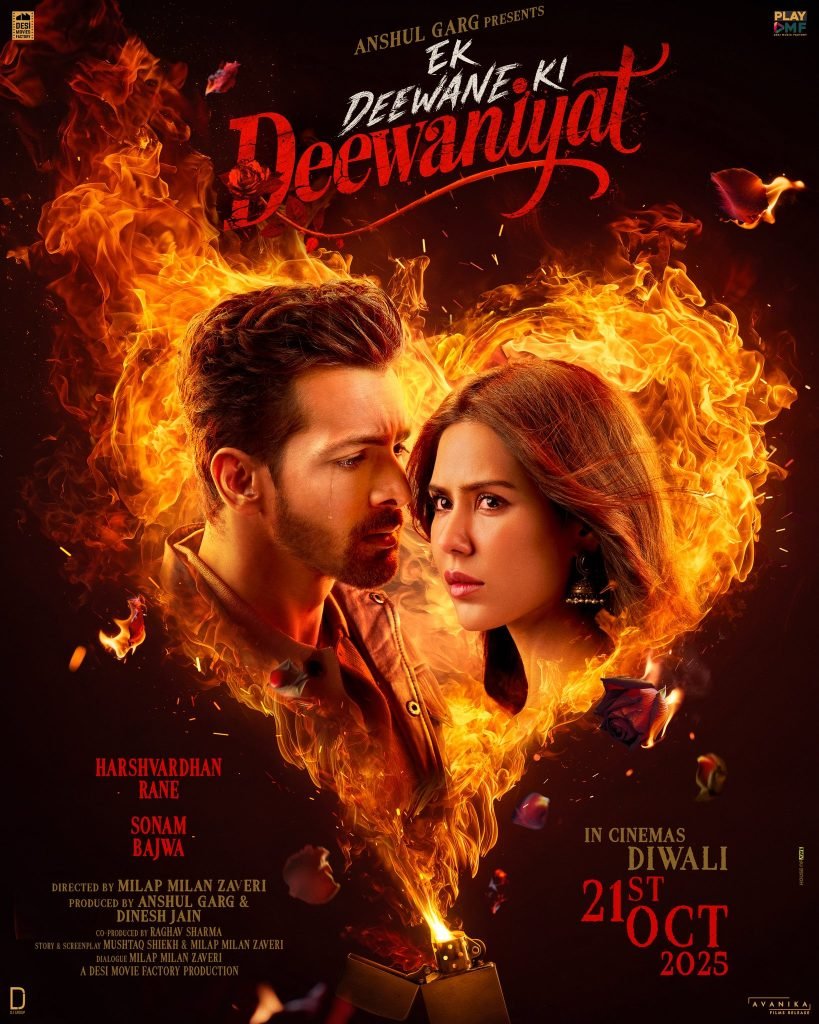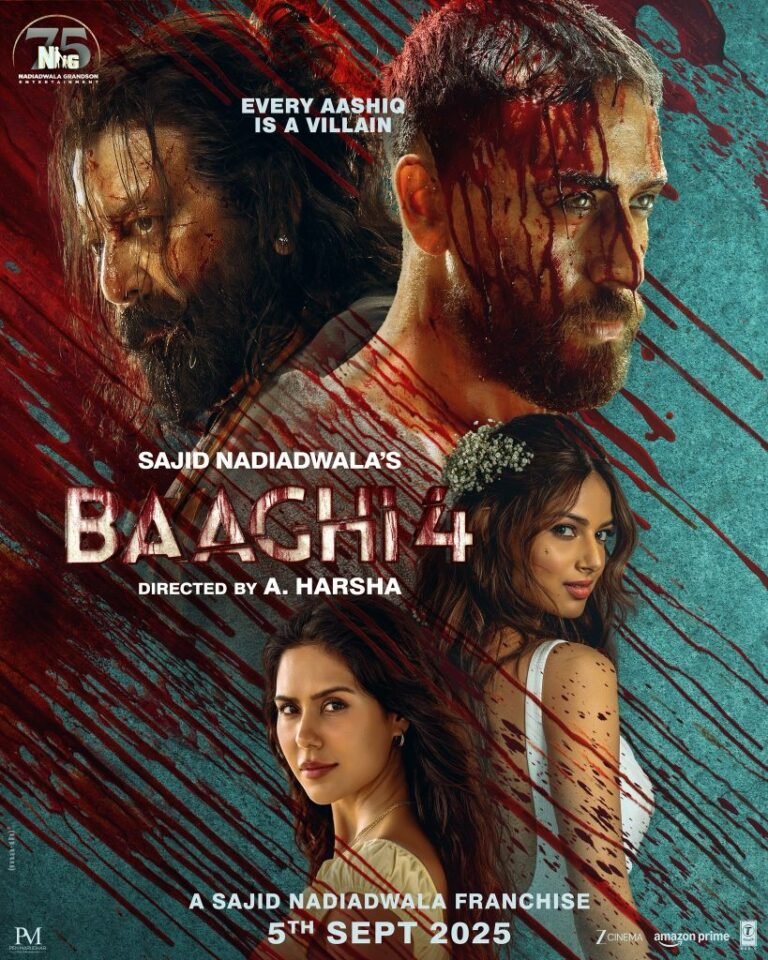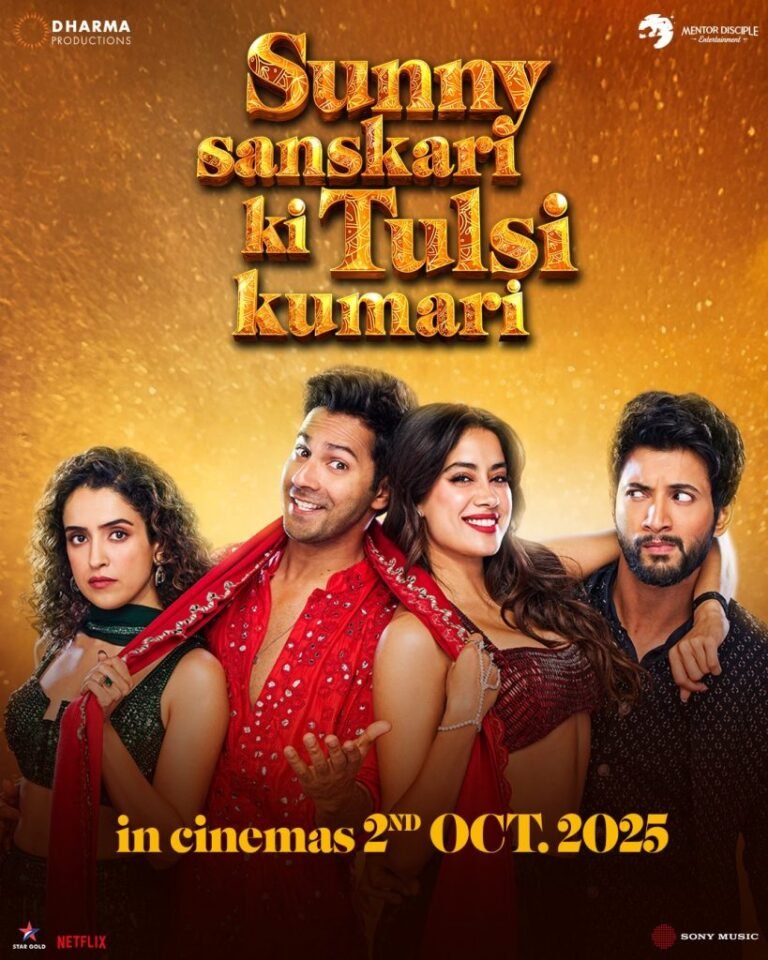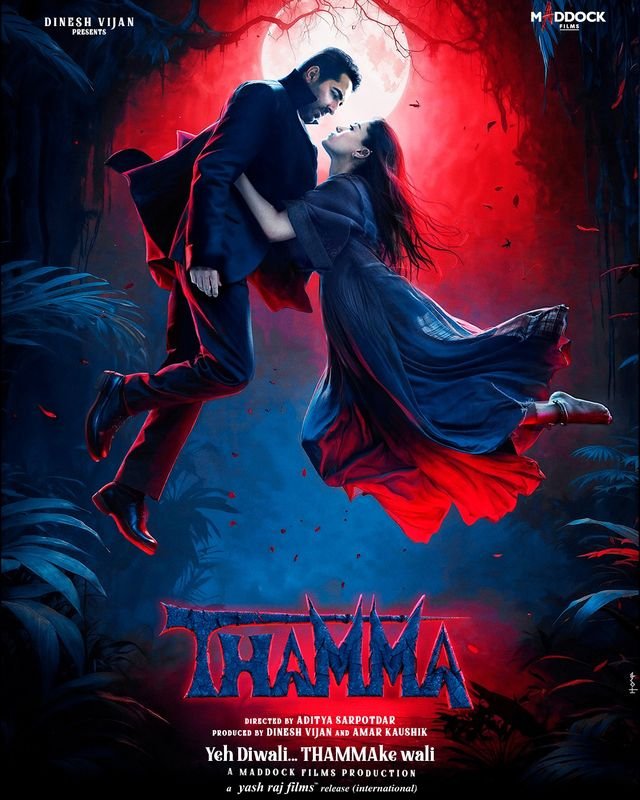Ek Deewane Ki Deewaniyat 2025
- Name: Ek Deewane Ki Deewaniyat 2025
- By: Milap Zaveri
- Duration: N/A
- Gener: Romance, Drama, Thriller
- Realeased: 2025
Summary:
Bollywood has always been fascinated by stories of love that cross the thin line between affection and obsession. From Darr to Kabir Singh, audiences have witnessed characters who love too deeply, too recklessly, and sometimes too destructively. Continuing this legacy, “Ek Deewane Ki Deewaniyat (2025)” brings forth another passionate saga that explores the darker shades of romance, starring Harshvardhan Rane and Sonam Bajwa in the lead roles. Directed by Milap Zaveri, this film dives into the world of obsession, politics, power, and pain where love becomes both a weapon and a wound.
Plot Summary
The story centers around Vikramaditya Bhonsle (Harshvardhan Rane), a powerful and ambitious politician with a haunting past. Beneath his composed exterior lies a storm of emotions and unresolved grief. His world takes a turn when he meets Adaa Randhawa (Sonam Bajwa) a free-spirited, independent, and strong-willed woman who values freedom over fame. What begins as a chance encounter soon blossoms into an intense relationship filled with desire, emotion, and vulnerability.
However, as their love deepens, the line between devotion and obsession starts to blur. Vikramaditya’s affection transforms into possessiveness, and Adaa finds herself torn between love and fear. The film’s second half unravels the consequences of love that loses control betrayal, heartbreak, and redemption.
Milap Zaveri, known for his massy dialogues and emotional intensity, gives the audience a love story that is equally poetic and painful. The narrative carries heavy undertones of psychological drama, wrapped in the glitter of Bollywood romance.
Performances
Harshvardhan Rane as Vikramaditya Bhonsle
Harshvardhan Rane delivers one of his most emotionally charged performances to date. His portrayal of a man torn between love and ego is gripping. The transformation from a soft-spoken lover to an obsessive figure of authority is gradual and believable. His expressive eyes carry both passion and pain, which make the audience empathize with his internal chaos even when his actions turn dark.
Rane’s chemistry with Sonam Bajwa forms the backbone of the film. His dialogue delivery, physical intensity, and brooding presence elevate even the most predictable scenes.
Sonam Bajwa as Adaa Randhawa
Sonam Bajwa shines as Adaa a character that beautifully balances grace and grit. Her portrayal of a woman trapped in an intoxicating relationship feels real and relatable. She doesn’t play Adaa as a helpless lover but as someone who struggles to find herself amid emotional manipulation. Her performance in the confrontation scenes is particularly powerful. Sonam adds depth to a role that could have easily been overshadowed by the male lead’s dominance.
Supporting Cast
The supporting characters add meaningful layers to the story. Actors like Zakir Hussain, Rajesh Khera, and Sadiya Siddiqui provide strong emotional support and help highlight the political and social themes surrounding the main plot. They are not just fillers but catalysts who help push the narrative forward.
Direction and Screenplay
Milap Zaveri is no stranger to melodrama, and Ek Deewane Ki Deewaniyat embraces his signature style completely. The film blends commercial Bollywood flair grand sets, stylized dialogues, and dramatic music with emotional storytelling. However, unlike his previous works, this film takes a darker and more psychological turn.
The screenplay in the first half is well-paced, setting up the romance with charm and mystery. The second half delves into obsession, control, and regret, which makes it emotionally heavy. Some viewers might find it slow-burning, but it’s deliberate meant to mirror Vikramaditya’s growing madness and Adaa’s fading hope.
Milap Zaveri handles the shift from romance to tragedy with confidence, though a few sequences could have been more subtle. Still, the film’s emotional intensity keeps the audience engaged till the end.
Cinematography and Visuals
Cinematographer Amit Roy paints the film in rich hues of red, gold, and grey symbolizing love, power, and decay. The visuals in Ek Deewane Ki Deewaniyat play a crucial role in storytelling. From the vibrant colors of festive celebrations to the dimly lit corridors of political offices, each frame carries emotion.
The film’s visual language complements the central theme that love, when corrupted by power, turns from bright passion to dark obsession. The camera lingers on expressions, rain sequences, and silent moments giving it an almost poetic touch.
Music and Background Score
Music has always been an integral part of Bollywood romances, and this film is no exception. The soundtrack features soulful compositions by Rajat Nagpal, Kaushik-Guddu, and Kunal Vermaa. Songs like “Ishq Ka Asar” and “Tere Bina Main Adhura” resonate deeply with the storyline. They capture the essence of longing, heartbreak, and madness in love.
The background score, composed by Tanishk Bagchi, enhances the emotional depth. The recurring violin themes and heavy percussion in dramatic scenes perfectly highlight the intensity of the lead pair’s relationship. The music doesn’t overpower it flows with the narrative.
Dialogues
Milap Zaveri’s writing style is known for its blend of poetic intensity and dramatic flair. Dialogues like “Pyaar agar sachcha ho, toh dard uska hissa hota hai” (“If love is true, pain becomes its companion”) strike a chord. The film’s lines are emotional and memorable without being overly exaggerated. They give the audience moments to pause and reflect on the fine line between love and obsession.
Editing and Pacing
The film’s editing, handled by Farhad Ahmed, keeps the runtime crisp despite its heavy themes. The transitions between romantic, political, and psychological sequences are smooth. The pacing in the first half is steady, while the second half intensifies with unpredictable emotional shifts. The climax, although slightly melodramatic, ties up the story effectively.
Themes and Symbolism
Ek Deewane Ki Deewaniyat explores several deep themes:
- The Madness of Love: The film questions how far a person can go in the name of love. Vikramaditya’s obsession is not just emotional — it’s symbolic of how power can twist human feelings.
- Freedom vs. Control: Adaa represents freedom, individuality, and emotional honesty. Her struggle against Vikramaditya’s possessiveness symbolizes every person’s fight for self-respect in toxic relationships.
- Politics and Passion: The movie cleverly blends political ambition with personal desire, showing how one feeds the other. Power becomes both a motivation and a curse.
The symbolism in the film is also subtle yet striking mirrors, rain, and fire appear repeatedly, reflecting emotional states and transformation.
Cinematic Strengths
- Strong Performances: Harshvardhan Rane and Sonam Bajwa carry the film effortlessly. Their chemistry is raw and believable.
- Visual Aesthetic: Stunning cinematography and color grading elevate the storytelling.
- Emotional Depth: The movie genuinely captures the highs and lows of love.
- Soulful Music: The songs linger long after the credits roll.
Weak Points
- Predictable Storyline: The plot follows a familiar path reminiscent of earlier Bollywood obsession dramas.
- Over-the-Top Moments: A few emotional scenes feel exaggerated, typical of Milap Zaveri’s style.
- Uneven Pacing: Some parts, especially in the second half, could have been tighter.
Despite these flaws, the film’s emotional honesty and strong performances make it worth watching.
Technical Brilliance
The film scores well on the technical front. The sound design captures every heartbeat, whisper, and outburst effectively. The costume design by Neeta Lulla adds authenticity from Adaa’s elegant modern outfits to Vikramaditya’s regal sherwanis and tailored suits that reflect his powerful persona. The production design perfectly mirrors the theme lavish yet cold, showing the emptiness behind power and luxury.
Climax and Ending
Without revealing spoilers, the film’s ending leaves a lasting impression. It doesn’t glorify obsession; instead, it portrays it as destructive and isolating. The final act is emotionally charged, closing with a message that love without respect is doomed to self-destruction. The resolution gives the audience closure but also lingers in memory long after the film ends.
Audience Reaction
The movie has received mixed to positive responses from audiences. While critics pointed out its melodramatic moments, the general audience appreciated its emotional core, cinematography, and music. Many viewers praised the performances of Harshvardhan Rane and Sonam Bajwa for their authenticity and chemistry. The film found particular appeal among young adults who connect with stories of intense, complicated love.
Final Verdict
“Ek Deewane Ki Deewaniyat (2025)” is an emotional roller coaster a film that speaks to the heart even when it breaks it. It’s not just a love story; it’s a journey through the darker corridors of human emotion, where love becomes an obsession, and desire turns into destruction.
If you’re someone who enjoys intense romantic dramas with strong performances and soulful music, this movie will not disappoint. But if you prefer light-hearted romance or fast-paced thrillers, the film’s slow, poetic style might test your patience.



